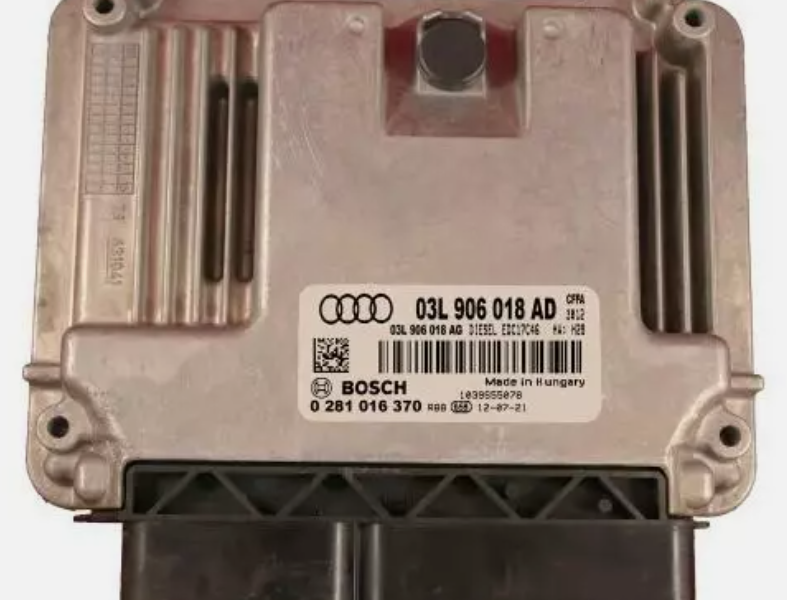ECU 03L906018AD 0281016370 AUDI

ECU 03L906018AD 0281016370 AUDI
This Electronic Control Unit (ECU) with part numbers 03L906018AD and 0281016370 is specifically designed for Audi vehicles. It is a crucial component responsible for controlling and regulating various engine operations, including fuel injection, ignition timing, and emissions control, ensuring the car’s optimal performance.
Key Information:
Part Numbers: 03L906018AD, 0281016370
Compatibility: Commonly used in Audi vehicles with 2.0 TDI engines, such as the Audi A3, A4, A6, and Q5, from model years 2010 to 2015. Please verify the part number with your vehicle’s VIN to ensure compatibility.
Function: Controls essential engine functions like fuel efficiency, performance optimization, and emission control.
Installation Recommendations:
Professional Installation: This ECU requires professional installation and programming. It needs to be paired with the vehicle’s VIN and other system components, so make sure the installation is done by a certified technician to avoid compatibility issues.
Care with Warranty Seals: The ECU comes with a warranty seal, which should not be tampered with. Any damage to the seal may void the warranty, so exercise caution when handling and installing the unit.
Delivery and Shipping:
Courier Services: This ECU is delivered through reputable courier services like DPD, DHL, Global Express, and UPS.
Estimated Delivery: Typical delivery times within the EU are between 5 to 7 days, depending on your location and the courier service used.
Product Weight: The ECU weighs under 1 kg, making it lightweight and easy to ship.
Make sure to double-check the part number to ensure compatibility with your specific Audi model before purchasing.
ECU Programming Services:
Custom Programming Available: If you send us a copy of your original ECU’s firmware, we can pre-program this ECU for you, making it a direct plug-and-play solution for your vehicle.
Step-by-Step Guide: We will provide a step-by-step guide to assist in the process of sending your ECU data and programming the new unit.
5 Reasons Why ECUs Fail
Electrical Overload
One of the most common reasons for ECU failure is an electrical overload. This can happen when there are power surges or short circuits in the vehicle’s electrical system. If the ECU receives too much voltage, it can damage the internal components, leading to malfunction or complete failure. Improper jump-starting, faulty alternators, or battery issues can also cause electrical overloads.
Water Damage
ECUs are typically housed in sealed enclosures to protect them from moisture. However, water can still enter the unit if the seals wear down or if the vehicle experiences flooding. When water comes into contact with the ECU’s internal circuits, it can corrode the components, causing failure. Prolonged exposure to high humidity or condensation can also weaken the ECU over time.
Heat Damage
Excessive heat is a major enemy of electronic components, and the ECU is no exception. High temperatures can cause the ECU to overheat, especially if it’s located near hot engine components. Over time, extreme heat can degrade the internal circuit board and connections, leading to ECU failure. Proper cooling and ensuring the ECU is placed in a well-ventilated area are critical for longevity.
Faulty Grounding
Grounding is essential for maintaining a stable electrical system in a vehicle. A bad ground connection can cause intermittent voltage spikes or drops, which can severely affect the ECU’s performance. Poor grounding can result from corrosion on grounding wires or connectors, loose bolts, or damaged grounding straps, and it often leads to erratic ECU behavior.
Vibration and Physical Impact
Vehicles naturally experience a lot of vibrations, especially on rough terrain, which can cause components inside the ECU to come loose or get damaged over time. Additionally, physical impact from accidents or improper handling during repair can break internal components, leading to failure. Ensuring the ECU is properly mounted and protected from excessive vibrations can help prevent these issues.
Understanding these failure causes can help vehicle owners take preventative measures to protect their ECU, ultimately prolonging the life of their vehicle’s electronics and ensuring optimal engine performance.